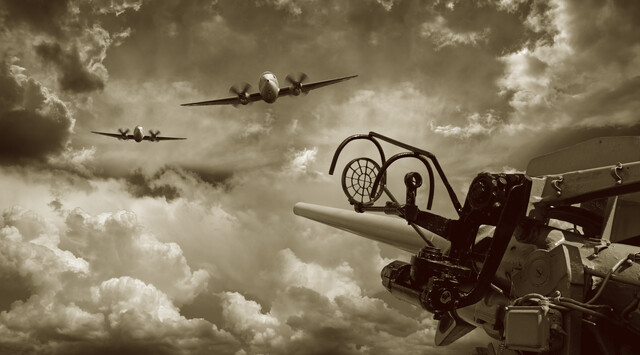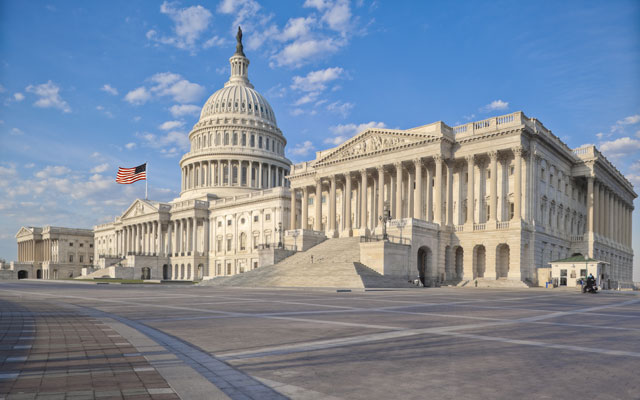Online Class: World War II

-
23Lessons
-
39Exams &
Assignments -
16Hours
average time -
1.6CEUs
Course Description
A Profound Exploration of the Conflict that Redefined Humanity
World War II was not merely a chapter in history; it was an era that redefined geopolitical landscapes, human rights ideologies, and the limits of human resilience. While the First World War had indeed set precedents in terms of scale and devastation, World War II transcended those boundaries. With a participation of over 100 countries, and directly involving more than 100 million personnel, it was, and remains, the most extensive war in history.
Advancements in technology during this period were staggering. We moved from horses and bayonets to tanks and jet fighters, from rudimentary grenades to nuclear weapons. The sheer firepower available meant not only larger battlefields but also deadlier consequences.
The juxtaposition of good versus evil, as portrayed by the Allies against the Axis Powers, had an almost cinematic feel. Germany, Japan, and Italy, with their aggressive ideologies and expansionist agendas, posed a tangible threat to the world's equilibrium. And resisting them was no small feat. The Allies, which included major powers like the USA, USSR, and the UK, were pushed to the brink of their resources and resolve.
Why did this war erupt, though? The signing of the Treaty of Versailles, post World War I, aimed to bring about long-standing peace. However, its reparations and territorial changes brewed resentment in Germany. Coupled with the global repercussions of the Great Depression, particularly its severe ramifications in Germany, the situation was ripe for extremist ideologies to take root. This provided fertile ground for Adolf Hitler's rise, subsequently leading to the formation of the Axis.
Germany's blitzkrieg tactics saw them annex significant portions of Europe, catching many nations off guard. Concurrently, Italy made moves in North Africa, and Japan was annexing islands in the Pacific, seeking to establish its dominance.
Yet, the significance of World War II extends beyond the battles and treaties. The war's aftermath brought about tectonic shifts in global politics and strategies:
-
Nuclear Age: The bombings of Hiroshima and Nagasaki ushered the world into the atomic age, highlighting the potential of human-led devastation.
-
Israel's Birth: The post-war scenario facilitated the establishment of Israel, a pivotal moment in Middle Eastern politics.
-
Communism's Spread: Many regions in Asia and Europe witnessed the rapid proliferation of communist ideologies.
-
Germany's Division: Post-war Germany was split, symbolizing the broader Cold War tensions.
-
America's Ascendancy: The US, having played a crucial role in the war, emerged as a dominant global power.
Our course offers an in-depth analysis of these events and more. A breakdown of our curriculum:
-
Lessons 1 & 2: Introduce key terminologies and course structures, setting the foundation for upcoming modules.
-
Lesson 3 to 5: Delve into the root causes, tracing back to the fall of the Weimar Republic and discussing the major Axis powers.
-
Lessons 6 to 13: An exhaustive study of the major battles, from the opening salvos, through Europe, North Africa, and the Pacific, to the ultimate victories.
-
Lesson 14: Unmask the harrowing truths of the Third Reich's horrors.
-
Lesson 15: Investigate the profound global implications post World War II.
-
Lessons 16 & 17: Learn about the pivotal figures on both sides of the war, understanding their motivations, strategies, and legacies.
World War II wasn't just a conflict; it was a transformative period that has shaped the contours of our contemporary world. Dive deep into the intricate web of events, decisions, and consequences with our comprehensive course, understanding the human stories interwoven with grand global narratives.
- Business
- Business Ethics Courses
- Harassment Prevention Courses
- Human Resources Certifications
- Management
- Aromatherapy Courses
- Caregiver Courses
- Career Development Courses
- Communications Courses
- Confidence and Self Esteem Courses
- Healing
- Human Anatomy Courses
- Medical Skills
- Health & Medicine
- Nutrition
- Marketing
- Microsoft Office Certification Courses
- Life Coaching Courses
- Self-Improvement
- Small Business Certifications
- Safety
- Writing Improvement
- Business Writing Courses
Course Lessons
Lesson 1. Insights into World War II Through Its Terminology
 Lesson 1 Video
Lesson 1 Video Review Practice Worksheet: Lesson-1-Activity-11088.pdf
Review Practice Worksheet: Lesson-1-Activity-11088.pdf Lesson discussions: Reasons for Taking this Course
Lesson discussions: Reasons for Taking this Course Assessment: Lesson 1 Review Exam
Assessment: Lesson 1 Review Exam
Lesson 2. Decoding WWII: Phrases and Frameworks
 Lesson 2 Video
Lesson 2 Video Review Practice Worksheet: Lesson-2-Activity-11089.pdf
Review Practice Worksheet: Lesson-2-Activity-11089.pdf Complete: Lesson 2 Activity
Complete: Lesson 2 Activity Assessment: Lesson 2 Review Exam
Assessment: Lesson 2 Review Exam
Lesson 3. Weimar's Fall, Hitler's Rise
 Lesson 3 Video
Lesson 3 Video Review Practice Worksheet: Lesson-3-HomeWork-11090.pdf
Review Practice Worksheet: Lesson-3-HomeWork-11090.pdf Complete: Lesson 3 Activity
Complete: Lesson 3 Activity Assessment: Lesson 3 Review Exam
Assessment: Lesson 3 Review Exam
Lesson 4. The Fall of the Weimar Republic: Prelude to Global Conflict
 Review Practice Worksheet: Lesson-4-WorkSheet-11091.pdf
Review Practice Worksheet: Lesson-4-WorkSheet-11091.pdf Assessment: Lesson 4 Review Exam
Assessment: Lesson 4 Review Exam
Lesson 5. Understanding Hitler's Impact on 20th Century History
 Lesson 5 Video
Lesson 5 Video Review Practice Worksheet: Lesson-5-Downloadable-11092.pdf
Review Practice Worksheet: Lesson-5-Downloadable-11092.pdf Assessment: Lesson 5 Review Exam
Assessment: Lesson 5 Review Exam
Lesson 6. Forgotten Partners of the Axis: Italy and Japan in WWII
 Lesson 6 Video
Lesson 6 Video Review Practice Worksheet: Lesson-6-HomeWork-11093.pdf
Review Practice Worksheet: Lesson-6-HomeWork-11093.pdf Assessment: Lesson 6 Review Exam
Assessment: Lesson 6 Review Exam
Lesson 7. Axis Partners: Italy, Japan, and Their Role in WWII
 Review Practice Worksheet: Lesson-7-WorkSheet-11095.pdf
Review Practice Worksheet: Lesson-7-WorkSheet-11095.pdf Complete: Lesson 7 Activity
Complete: Lesson 7 Activity Assessment: Lesson 7 Review Exam
Assessment: Lesson 7 Review Exam
Lesson 8. The Fuse is Lit: Germany's Aggressive Prelude to World War II
 Lesson 8 Video
Lesson 8 Video Review Practice Worksheet: Lesson-8-WordSearch-11096.pdf
Review Practice Worksheet: Lesson-8-WordSearch-11096.pdf Complete: Lesson 8 Activity
Complete: Lesson 8 Activity Assessment: Lesson 8 Review Exam
Assessment: Lesson 8 Review Exam
Lesson 9. The Lightning Strikes: Germany's Invasion of France and the Battle of Britain
 Lesson 9 Video
Lesson 9 Video Review Practice Worksheet: Lesson-9-HomeWork-11097.pdf
Review Practice Worksheet: Lesson-9-HomeWork-11097.pdf Assessment: Lesson 9 Review Exam
Assessment: Lesson 9 Review Exam
Lesson 10. The Phoney War
 Lesson 10 Video
Lesson 10 Video Review Practice Worksheet: Lesson-10-Downloadable-11098.pdf
Review Practice Worksheet: Lesson-10-Downloadable-11098.pdf Complete: Lesson 10 Activity
Complete: Lesson 10 Activity Assessment: Lesson 10 Review Exam
Assessment: Lesson 10 Review Exam
Lesson 11. The German-Soviet Struggle: From Blitzkrieg to Stalingrad
 Lesson 11 Video
Lesson 11 Video Review Practice Worksheet: Lesson-11-WorkSheet-11099.pdf
Review Practice Worksheet: Lesson-11-WorkSheet-11099.pdf Complete: Lesson 11 Activity
Complete: Lesson 11 Activity Assessment: Lesson 10: The Eastern Front
Assessment: Lesson 10: The Eastern Front Assessment: Lesson 11 Review Exam
Assessment: Lesson 11 Review Exam
Lesson 12. France's Fall, Britain's Stand
 Review Practice Worksheet: Lesson-12-Activity-11100.pdf
Review Practice Worksheet: Lesson-12-Activity-11100.pdf Complete: Lesson 12 Activity
Complete: Lesson 12 Activity Assessment: Lesson 12 Review Exam
Assessment: Lesson 12 Review Exam
Lesson 13. Desert Warfare and the Turning Tide of World War II
 Lesson 13 Video
Lesson 13 Video Review Practice Worksheet: Lesson-13-Activity-11101.pdf
Review Practice Worksheet: Lesson-13-Activity-11101.pdf Assessment: Lesson 9: The North African Campaign
Assessment: Lesson 9: The North African Campaign Assessment: Lesson 13 Review Exam
Assessment: Lesson 13 Review Exam
Lesson 14. Midway: The Game-Changing Battle
 Lesson 14 Video A
Lesson 14 Video A
 Lesson 14 Video B
: Lecture on The Pacific Theatre
Lesson 14 Video B
: Lecture on The Pacific Theatre
 Lesson 14 Video C
: Lecture on The Pacific Theatre: The Doolittle Raid
Lesson 14 Video C
: Lecture on The Pacific Theatre: The Doolittle Raid
 Lesson 14 Video D
: Discussion on Leyte Gulf
Lesson 14 Video D
: Discussion on Leyte Gulf
 Lesson 14 Video E
: Coral Sea and Midway Discussion
Lesson 14 Video E
: Coral Sea and Midway Discussion
 Lesson 14 Video F
: Battle of Okinawa
Lesson 14 Video F
: Battle of Okinawa
 Lesson 14 Video G
: Pacific Theater Final Discussion
Lesson 14 Video G
: Pacific Theater Final Discussion
 Review Practice Worksheet: Lesson-14-HomeWork-11102.pdf
Review Practice Worksheet: Lesson-14-HomeWork-11102.pdf Assessment: Lesson 12: The Pacific Theatre
Assessment: Lesson 12: The Pacific Theatre Assessment: Lesson 14 Review Exam
Assessment: Lesson 14 Review Exam
Lesson 15. Operation Overlord and Beyond: Triumphs on the Path to Peace
 Lesson 15 Video
Lesson 15 Video Review Practice Worksheet: Lesson-15-WorkSheet-11103.pdf
Review Practice Worksheet: Lesson-15-WorkSheet-11103.pdf Assessment: Lesson 13: The End of the War: Victories in Europe and Japan
Assessment: Lesson 13: The End of the War: Victories in Europe and Japan Assessment: Lesson 15 Review Exam
Assessment: Lesson 15 Review Exam
Lesson 16. Operation Barbarossa: The Massive Nazi Offensive Against Soviet Russia
 Review Practice Worksheet: Lesson-16-Downloadable-11104.pdf
Review Practice Worksheet: Lesson-16-Downloadable-11104.pdf Assessment: Lesson 16 Review Exam
Assessment: Lesson 16 Review Exam
Lesson 17. Monte Cassino: The Impregnable Fortress Unveiled
 Lesson 17 Video
Lesson 17 Video Review Practice Worksheet: Lesson-17-HomeWork-11105.pdf
Review Practice Worksheet: Lesson-17-HomeWork-11105.pdf Assessment: Lesson 11: The Italian Campaign
Assessment: Lesson 11: The Italian Campaign Assessment: Lesson 17 Review Exam
Assessment: Lesson 17 Review Exam
Lesson 18. Strategic Shifts in the Pacific: From Japanese Expansion to Allied Ascendancy
 Review Practice Worksheet: Lesson-18-WorkSheet-11106.pdf
Review Practice Worksheet: Lesson-18-WorkSheet-11106.pdf Assessment: Lesson 18 Review Exam
Assessment: Lesson 18 Review Exam
Lesson 19. The End of World War II: A New Era Begins
 Review Practice Worksheet: Lesson-19-WordSearch-11107.pdf
Review Practice Worksheet: Lesson-19-WordSearch-11107.pdf Assessment: Lesson 19 Review Exam
Assessment: Lesson 19 Review Exam
Lesson 20. The Holocaust: The Systematic Eradication of Innocence
 Lesson 20 Video
Lesson 20 Video Review Practice Worksheet: Lesson-20-Activity-11108.pdf
Review Practice Worksheet: Lesson-20-Activity-11108.pdf Assessment: Lesson 14 Exam: The Horrors of the Third Reich
Assessment: Lesson 14 Exam: The Horrors of the Third Reich Assessment: Lesson 20 Review Exam
Assessment: Lesson 20 Review Exam
Lesson 21. Rise of Superpowers: Cold War's Beginnings
 Lesson 21 Video
Lesson 21 Video Review Practice Worksheet: Lesson-21-HomeWork-11109.pdf
Review Practice Worksheet: Lesson-21-HomeWork-11109.pdf Assessment: Lesson 15 Exam: The Aftermath of World War II
Assessment: Lesson 15 Exam: The Aftermath of World War II Assessment: Lesson 21 Review Exam
Assessment: Lesson 21 Review Exam
Lesson 22. Leaders of Destruction: Axis Figures in WWII
 Lesson 22 Video
Lesson 22 Video Review Practice Worksheet: Lesson-22-WordSearch-11110.pdf
Review Practice Worksheet: Lesson-22-WordSearch-11110.pdf Assessment: Lesson 16 Exam: Prominent Figures of World War II: The Axis
Assessment: Lesson 16 Exam: Prominent Figures of World War II: The Axis Assessment: Lesson 22 Review Exam
Assessment: Lesson 22 Review Exam
Lesson 23. WWII Allied Leaders
 Lesson 23 Video
Lesson 23 Video Review Practice Worksheet: Lesson-23-Downloadable-11111.pdf
Review Practice Worksheet: Lesson-23-Downloadable-11111.pdf Lesson discussions: End of Course Poll; Course Comments
Lesson discussions: End of Course Poll; Course Comments Assessment: Lesson 17 Exam: Prominent Figures of World War II: The Allies
Assessment: Lesson 17 Exam: Prominent Figures of World War II: The Allies Assessment: Lesson 23 Review Exam
Assessment: Lesson 23 Review Exam
Learning Outcomes
- Define key World War II terms such as 'Axis Powers,' 'Allied Powers,' and 'Blitzkrieg' to demonstrate foundational understanding of the conflict's terminology.
- Recognize the significance of the Afrika Korps and their impact on North African military strategies by summarizing their operations and strategic role in WWII.
- Describe the ideological and military strategies used during World War II through the examination of terminologies like Nazism, Neutrality Acts, and Operation Overlord.
- Identify key terms and concepts from World War II, including their origins and significance, to explain their impact on the war's progression and outcome.
- Analyze the role of individual leaders, including Paul von Hindenburg and Adolf Hitler, in the transition from the Weimar Republic to Nazi control, highlighting specific decisions and their impacts on Germany's political landscape.
- Define the key economic and political factors that contributed to the fall of the Weimar Republic and the rise of Adolf Hitler by examining historical events and conditions from 1919 to 1933.
- Analyze the impact of the Treaty of Versailles on Germany's economy and society, and its role in facilitating the rise of extremist parties during the Weimar Republic.
- Define the key factors contributing to the collapse of the Weimar Republic, including economic instability, flawed institutions, and individual actions.
- Analyze Hitler's ideologies and their role in the instigation of World War II and the Holocaust.
- Demonstrate an understanding of the key events in Adolf Hitler's rise to power and their impact on Nazi Germany's formation.
- Define the expansionist ambitions of Italy and Japan during World War II, including key military campaigns and their outcomes.
- Describe the military and ideological contributions of Italy and Japan to the Axis Powers' efforts in World War II, highlighting key campaigns and alliances.
- Recognize the expansionist ambitions and fascist ideologies of Italy under Mussolini and Japan under Hirohito during World War II.
- Demonstrate mastery of lesson content at levels of 70% or higher.
Additional Course Information

- Document Your Lifelong Learning Achievements
- Earn an Official Certificate Documenting Course Hours and CEUs
- Verify Your Certificate with a Unique Serial Number Online
- View and Share Your Certificate Online or Download/Print as PDF
- Display Your Certificate on Your Resume and Promote Your Achievements Using Social Media

Student Testimonials
- "The range of topics discussed in this course was very helpful in understanding the 3 main theaters of World War II." -- Gabrielle M.
- "I was blown away by the amount of information given in 17 lessons! I would love to take a class just on the Holocaust. Thank you for putting this together. Very well done ! :)." -- Christianne M.
- "I have loved this course. Mac is so helpful and fun to learn from. He has made learning history fun for the first time in my life. He gives great feedback to my assignments which I haven't really experienced on here before. By far the best teacher in the forum! Thanks so much!" -- Nicola P.
- "This class was extremely educational, organized and very detailed. The assignments were thorough and thought-provoking, and encouraged critical thinking." -- Leigh T.
- "This course is excellent. Mac is a great proctor of the class. His feedback on multiple emails has been really interesting and enjoyable. I would recommend this course to anyone who is interested in learning more about World War II." -- Brian M.
- "I found this class to be very helpful. The structure was effective and did a good job ensuring that I learned, despite being an online course. The structure seemed very effective." -- Chris M.
- "The instructor was very helpful!!!" -- Lisa M.
- "Great course! The video was most help. Also, the professor graded and commented on my tests quickly." -- John L.
- "I felt like I was able to connect easily with this instructor. The feedback from the instructor was very helpful. I enjoyed hearing from him and reading his comments on the written assignments. He was extremely well versed on the subject matter and enthusiastic on all topics included. Thanks for everything! " -- Stacey M.
- "Good instructor." -- Robert P.








